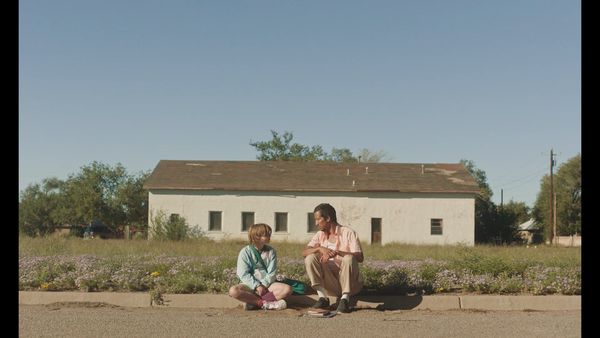 |
| Firstness Photo: Brielle Brilliant |
The story of struggling single father Keith (Tim Kinsella), his non-binary child Tavi (Spencer Jording), and the recently released prisoner, Julian (Caleb Cabrera), whom Tavi befriends, Firstness is the début feature-length work by artist and filmmaker Brielle Brilliant. It recently screened at OutFest Los Angeles, where it made quite an impression due to its gentle pace and unusual style. Towards the end of the festival I connected with the director to ask them why they chose this particular story, and this moment, so break through into features.
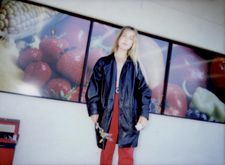 |
| Brielle Brilliant |
“The form of something is not in my control,” they begin, explaining that they’re more focused on process. “At first, I investigate that and I try to figure out where it lives. And so I feel like for a long time, working on Firstness, I wasn't sure if it was a big ass philosophy text, like if I was writing a big ass book, you know? Or if it was that I was following around...” They pause, thinking. “I met this character, Tavi. I wasn’t sure if it was like, a little movie about this kid, or if it was more just a personal journal type of thing, following Keith around. Like, what are these anxieties or fears going on?
“So it took a little while – it just kind of takes the amount of time it takes, like when you’re trying to figure out where you want to live. You know? When you're feeling out of place. And you're like, what could I really do here? Can I get my groceries here, can I bring all my friends here? Because I have this kind of community. And so then it was just so, so crystal clear at a certain point where things started falling into its flow.”
I explain that I find it refreshing because it's a story with a non binary character, which isn't about the fact that they're non binary, and that's something that’s still quite unusual.
“Yeah, I mean, I needed to see Tavi. I wish that I could have met Tavi earlier in my life. And so when I met Tavi, I was like, I’ve got to get this kid out there. It's like when you meet someone, a new friend, and they've suddenly transformed your life, and you want everyone else that you care about to know them and learn, you know, just be around them. Tavi being so free, it’s really important to share with people, especially other non binary people, so we could see ourselves and say, yeah, yeah, there we are. And also, that's not me, that's really their own self. And that's the beautiful thing about films about stories, is that it's never you but you can kind of start going, ‘Oh, I hang out with that that person,’ or maybe that person, for example, may have certain capacities.”
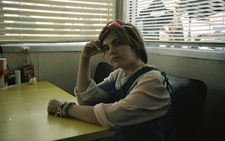 |
| Spencer Jording |
It seems like a generational thing as well, I suggest, because the one person who does really take a stand on that in the course of the film is another kid. For their generation the existence of gender variance is much more obvious and straightforward to deal with.
“Yeah, it seems so obvious for Maxine, that character, like, ‘Well, this is what my friend is, this is what my friend does. I feel like every human is very balanced by certain confinements of language and structures, and how we talk about things and how we organise our realities. So sometimes with the older generation, it completely disrupts their entire way of being alive. When they're like, ‘Wait, you want to put a new a new word in here, like the singular they?’ And it's like, ‘What's new?’ Everyone is kind of adjusting the dials to whoever you're next to all the time already. What did you think we were doing?”
And this seems to be a film that's all about people dealing with new situations of different kinds. With suddenly being on the outside of prison, or with being the sole person responsible for a child...
“Yeah, they're all kind of prison survivors. That word prison survivor was given to me by Kirsten Eidenbach, who plays the clerk at the end. And she actually runs this place called ATLaS Justice Center, which is like a reentry programme for people, for prisoner survivors or people who were recently incarcerated, who are trying to orient what it meant to survive something like that. And it was really amazing to meet her, when we were trying to cast that character.
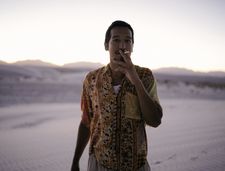 |
| Caleb Cabrera as Julian |
“This whole script, for me, is sort of about how all these different characters are surviving these entrapments in different ways. You know, Keith is kind of hidden, trapped in his mind and his cravings and his expectations and hobbies, trapped in a reality that kind of negates their freedom and their truth of themselves. And Julian's trapped in the punishment industry that really equates him with the action of harm that he may or may not have done, and profits from that, from acquainting his humanness with just this one potential action. It's very important to me to facilitate those kinds of conversations about how to get more free.”
The film features some incredible wide open landscapes. Is that deliberate contrast?
“Exactly. And those landscapes...” They inhale deeply. “The light there just is, it's really wild to spend time there and to see how it can shift things in you. The Mescalero Apache land, also known as southern New Mexico, is one hour away from Roswell, this beloved alien community, and two hours south of Taos where everybody records their records and, you know, an hour away from the White Sands where the first atomic bomb was detonated. So it's like, there's so much in a single frame of the land. And it's like, what do we call it? How do we talk about it? How do we live in it and attend to certain descriptions or histories? Or what are we bringing?”
How did they arrive at that location and decide that was what they were going to use?
“It's never like a super conscious thing,” they say. “Once I met Tavi, and their dad and Julian, it was like, ‘Oh, they live in New Mexico. So now I’ve got to go visit them.’ And so I asked one of my best friends, Luca, if he would drive around with me. I look for where the story is going to take place. And we ended up in the middle of the desert hearing bottles smashing into bits. And it was a very strange firstness that was happening to my ears, the smashing of bottles when I can't see them. And then we walked a little bit and we saw these much older people that were all recycling these bottles by throwing them into this ditch, and it turns out that one of them was the mayor of the town. And so then we asked if we could film there, and then a year later came back and filmed. They were so generous. But that's the whole thing. Sometimes life assembles itself, you know?”
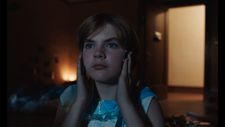 |
| Spencer Jording as Tavi |
So how did they cast the film? I ask if Spencer Jording is non-binary and if that was a concern for Brielle.
“Yeah, so Spencer, he's a boy now, but when we cast him, he was using xir and xie pronouns. And he’s from Brooklyn, which is where I'm from. We looked at hundreds and hundreds of tapes of kids and we met a bunch of people, and once I saw Spencer's tape it was just really, really, really clear. There’s something about the way that one little glance could land so fully present. It’s a really rare quality for humans in general, because we are very entangled with other narratives and our thoughts, and it's hard to access that. And so when you can really see that, which was so clear with Spencer, it was just like, ‘Alright, I'm flying to New York.’ And it was really fun.
“Tavi was a source of calm for both of us. We both can just like, kind of sometimes be a little overwhelmed. And then we'd be like, but let's get to Tavi. And then both of us will be like ‘Look, we've got these organs working in our bodies, and we've got carbon and oxygen!’ In Tavi’s little flashlight, reality.”
I ask about casting Caleb and how the two worked together, because it's such an important relationship in the film.
“Yeah,” they say. “Caleb was cast pretty early. And I was really certain about him too. I just felt really clear with Caleb. And we worked on a lot of dance stuff. I’m a dancer. And then the two of them met, and they just totally got along. We would talk about their connection and how they understand they have a relationship to the land and to being human that lot of other humans don't know. That was the way that I oriented us discussing this connection.
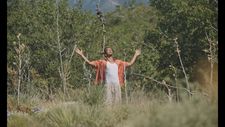 |
| Julian dancing |
“They both totally understood. Like, a lot of times people look at certain connections that you have, and they have no idea what the fuck you guys do together. They're just like, ‘You got it. This doesn't make any sense, right?’ But for some reason you never thought twice, because you just feel so clearly understood by this person and you can't see all the details of what other people see. You just have a really strong feeling and that feeling is is knowledge that you'll stick up for.”
The film being picked up by OutFest was amazing, they say.
“I feel so grateful. It was so special to see it on the big screen and to have Spencer come out. We went to a big punk show after. It was just really, really super fun, you know?
“I feel very grateful and excited for more people to see it, and to hear how people are assembling it. Really, the most compelling thing for me is hearing how people I don't really know, and other people that I do know, how they're assembling this reality and these characters, and what their personal relationships are to each image or each sound. Because for me - and I'm kind of a nerd – I'm really interested in how contact works. Like when you're sitting here and you get this image of what happened to you before you came into the theatre, I want to know, you know? So I'm really excited to expanding into having more conversations.”





















